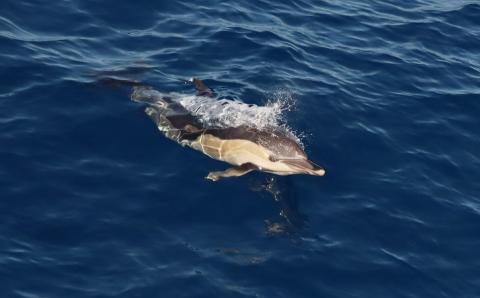
- The main impacts of climate change continue to be geographic range shifts, reduction in suitable habitats, food web alterations and increased prevalence of disease.
- Evidence for range shifts is increasing, with an apparent northward shift in some warmer water cetacean species around the UK. For example, pilot whale populations in the northwest Atlantic have shifted northward at a faster rate than expected, more than three times the rate of their preferred prey species.
- Increasing sea surface temperatures and marine mammal range shifts are resulting in novel interactions and increased predation risk and competition for species.
- New evidence continues to support understanding that changes in summer algal blooms and zooplankton affect important prey species such as sandeels.
Medium evidence, medium consensus
The evidence for range shifts in several cetacean species in waters around the United Kingdom has increased since the last report. In addition, there have been more reports noting increasing occurrence of disease or novel diseases and fatal poisonings from HABs (Sanderson and Alexander, 2020; Tracy et al., 2019; Byers, 2021). However, more work is needed to understand the impacts of environmental variables beyond temperature (including ocean acidity, dissolved oxygen concentration, and salinity), to better understand the variability in responses of both hosts and pathogens, and to distinguish the impacts of climate change from other pressures in the environment or determine the causal relationships (many of the effects of climate change are indirect and determining causation from correlation can be difficult; Berkhout et al., 2014; Byers, 2021). Beyond this, there has been little published that might help improve our confidence assessments overall.
- Species closely tied to their breeding grounds, are more likely to be affected by changes in sea surface temperature as this will impact both habitat availability and the breeding behaviours associated with that habitat.
- Risks to marine mammals from disease and thermal stress may increase.
- Changing environmental conditions may affect when marine mammals breed, particularly those species that build up energy stores beforehand.
- Marine mammals face an increase in the cumulative impacts from climate change and other increasing pressures such as marine renewable expansion.
Low evidence, medium consensus
As per the ‘what is already happening’ assessment.
- Long-term monitoring of marine mammals around the UK to enable identification of changes in distribution and abundance, trends in infectious diseases and strandings, and changes in phenology.
- Improved understanding of cumulative impacts through increased long-term data collection on anthropogenic-induced stressors in the marine environment and the development of ecosystem models.
- A better understanding of how marine mammals might respond to changes further down the trophic chain.